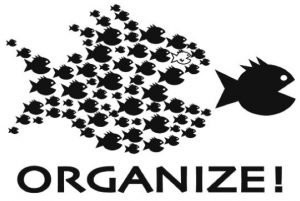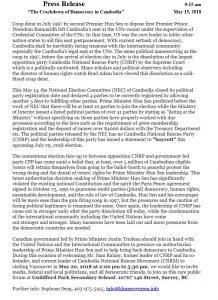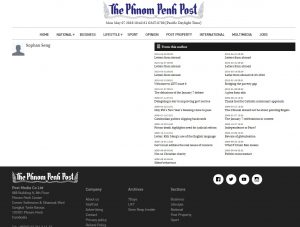«ប្រើគំនិតធ្វើសង្គ្រាមប្រឆាំងរបបអំណាចផ្តាច់ការ»
និពន្ធដោយលោកបណ្ឌិត ហ្គាហ្វារ ពាងម៉េត
ថែ្ងទី១៦ ខែឧសភា ឆ្នាំ២០១៨


រូបភាពខាងលើនេះបង្ហាញព្រឹត្តិការណ៍ពីរបែប ៖ ព្រឹត្តិកាណ៍មួយបែបសំដែងអំពី «ភាពធម្មជាតិ» (ភាពមុនមានអារ្យធម៌ ) ពោលគឺវាជាធម្មជាតិសត្វលោកដែលតម្រូវឱ្យ ធ្វើអ្វីដែលអាចធ្វើបានដើម្បីរក្សាអាយុជីវិតនិងបំរើផលប្រយោជន៍របស់ខ្លួន ។ បើអាធំវាអាចស៊ីអាតូចបានគឺវាស៊ីហើយដើម្បីបំពេញក្រពះវា បើអាខ្លាំងវាអាចជាន់ អាខ្សោយបានគឺវាជាន់ហើយដើម្បីបំពេញសេចក្តីត្រូវការរបស់វា ។ ព្រឹត្តិការណ៍មួយបែបទៀតបង្ហាញអំពីលទ្ធផលនៃភាពដឹកនាំដ៏មានប្រសិទ្ធភាពរបស់ត្រី តូចៗ ពីរឬបី ដែលបំផុសបំផុលការស្រមើស្រមៃច្នៃប្រឌិត បញ្ចុះបញ្ចូលសត្វត្រីតូចៗទាំងឡាយដែលមានធម្មជាតិធ្វើតាម ឱ្យប្រមូលពូនផ្តុំពង្រាយតួបង្កើតជារូបភាពមួយ បញ្ចេញរូប រាងជាសត្វត្រីមានតួធំគួរ ល្មមអាចធ្វើឱ្យរំភើបស្ញប់ស្ញែងបាន ។ សត្វត្រីតូចៗទាំងនោះវាធ្វើ តាមការបំផុលនៃត្រីដឹកនាំពីរឬបីដែលចេះច្នៃប្រឌិត វាតម្រៀបតួ ហែលព្រមៗគ្នាបញ្ចេញកលល្បិចតាមអំពើបំផុល ដោយហាមាត់យ៉ាងធំហែលដេញត្របាក់ត្រីធំដែលហែលរត់ពី មុខស្លោភ្នែកគេចពីមាត់សត្វត្រីតូចៗហែលដេញតាមពីក្រោយ ។
កាលពីសតវត្សទី ១៧ មានទស្សនវិទូជាតិអង់គ្លេសឈ្មោះលោក ថូម៉ាស់ ហប់ស៍្យ Thomas Hobbes (១៥៨៨-១៦៧៩) ដែលត្រូវបានគេចាត់ទុកថាជាស្ថាបនិកទស្សនវិជ្ជាសម័យទំនើប ម្នាក់នៃលោកខាងលិច បានសរសេរសៀវភៅមួយក្នុងឆ្នាំ ១៦៥១ ឈ្មោះ «លីវ៉ៃយ៉ាថាន់» Leviathan ដែលមានគេបានយកទៅបង្រៀននៅក្នុងសកលវិទ្យាល័យអាមេរិកាំងរហូតដល់ សព្វថ្ងៃ ចែងអំពីជីវិតនៅក្នុងភាពធម្មជាតិថា ជាជីវិត «អាក្រក់អាក្រី, ព្រៃផ្សៃ និង ខ្លី» ឬ «nasty, brutish and short» ។ រូបភាពទីមួយនេះបង្ហាញនូវទស្សនៈលោក ហប់ស្ស៍ ច្បាស់ល្អ ។ ខ្ញុំយករូបភាពទីពីរជាឧទាហរណ៍នៃការចាំបាច់ក្នុងការប្រើគំនិតនិងអនុវត្តិរបៀបគិត how we think ជាជាងយកព័ត៌មាននិងស្ថិតិដែលយើងប្រមូលបាន what we know ដែល កំណត់អនាគតរបស់យើង — រុងរឿង ល្អ មិនសូវល្អ ឬអាក្រក់ ។ ព្រះពុទ្ធបានប្រៀនប្រដៅជាង ២៥០០ ឆ្នាំមកហើយថា បុគ្គលមនុស្សជាអ្នកទទួលខុសត្រូវលើអ្វីៗដែលបានឬមិនបានធ្វើ។ បន្ទាប់ទៅនេះ ខ្ញុំសូមជូននូវក្របខ័ណ្ឌសាមញ្ញមួយស្តីអំពីគំនិតនិងរបៀបយើងគិត ។ ក្របខ័ណ្ឌនេះអាចជួយបំភ្លឺអំពីបុព្វហេតុនានាដែលបណ្តុះបណ្តាលយើងឱ្យក្លាយទៅជា បុគ្គលមនុស្សដូចសព្វថ្ងៃនេះ និងជួយពន្យល់អំពីហេតុនៃភាពសកម្ម ឬអកម្ម របស់យើង ។
គំនិតនិងរបៀបយើងគិតបានកើតចេញពី «សង្គមូបនីយកម្ម» ឬ socialization បកប្រែមកថា ដំណើរការជីវិតរបស់បុគ្គលមនុស្ស ដែលមានភ្នាក់ងារ «សង្គមូបនីយកម្ម» ឬ ភ្នាក់ងារសាប ព្រោះឥទ្ធិពលចំនួន ៧ ក្រុមបណ្តុះនូវគុណសម្បត្តិ ជំនឿ ការយល់ដឹង ព្រមទាំងឥរិយាបទ ឬអាកប្បកិរិយារបស់បុគ្គលមនុស្ស ។ គឺ «សង្គមូបនីយកម្ម » ឬដំណើរការជីវិតនេះហើយ ដែលផ្តល់ «វិញ្ញាណយល់ឃើញ» ឬ perception ហើយគឺវិញ្ញាណយល់ឃើញនេះឯងដែល ជម្រុញបុគ្គលមនុស្សឱ្យធ្វើ ឬមិនធ្វើសកម្មភាពអ្វីមួយ ។ យោងតាមក្របខ័ណ្ឌនេះ អ្នកអាច យល់បានអំពីមូលហេតុដែលនាំអ្នកឱ្យធ្វើឬមិនធ្វើ សកម្មភាពនយោបាយនៅពេលសព្វថ្ងៃ នេះ ។
ខ្ញុំសូមរាយជូននូវភ្នាក់ងារសាបព្រោះឥទ្ធិពលទាំង ៧ ក្រុម មាន ៖
១. គ្រួសារ (family) ដែល មានឥទ្ធិពលខ្លាំងបំផុតក្នុងការបត់បែនចិត្តគំនិតអ្នក
២. សាលារៀន (school) ដែលមានភារៈ បង្ហាត់បង្រៀនអ្នកឱ្យមានចំណេះចេះដឹង និងអប់រំអ្នកឱ្យចេះគិត ចេះពិចារណាស៊ីជំរៅ
៣. ភឿនក្លើតាំងពីក្មង (childhood peers) ដែលរត់លេងតាំងពីតូចជាមួយអ្នកនិងមិត្តភ័ក្តិ អ្នកនៅពេលបច្ចុប្បន្ន (ចាស់ទុំខ្មែរប្រដៅថា «នៅនឹងគោ គោនាំដេក នៅនឹង សេក សេកនាំ ហើរ» )
៤. ជំនឿសាសនា (religious beliefs) ជឿបុណ្យ ជឿបាប
៥. មុខរបរចិញ្ចឹមជីវិត(occupation) មុខរបរជាទាហានមានឥទ្ធិពលលើអ្នកមិនដូចជាមុខរបរជាមេដឹកនាំសាសនាទេ
៦. ប្រព័ន្ធផ្សព្វផ្សាយនានា (mass media) កាសែត វិទ្យុទូរទស្សន៍របស់រដ្ឋនិងកាសែតវិទ្យុទូរទស្សន៍ឯកជនឯករាជបណ្តុះវិញ្ញាណ យល់ឃើញខុសពីគ្នា
៧. ព្រឹត្តិការណ៍ជាប្រភេទ (specific events) ដូចជាការពិសោធន៍ថ្ងៃ ១៧ មេសា និងរបបខ្មែរក្រហម ឬ ការពិសោធន៍ថ្ងៃទី ៧ មករា និងការឈ្លានពានប្រទេសកម្ពុជាដោយកងទ័ពយួនហាណូយ ។
ដើម្បីងាយចាំ ខ្ញុំសូមជូនអក្សរកាត់ថា FSPROMS (អានថា «អែហ្វ អែស ប៉្រុមស្ស៍ ») ដែលជា ភ្នាក់ងារបណ្តុះឥទ្ធិពល ។ ដើម្បីកសាងអនាគតដែលយើងចង់បាន យើងត្រូវបញ្ឈប់ «គំនិត និងទង្វើបន្តពូជ» ពោលគឺឈប់គិតនិងឈប់ធ្វើអ្វីដដែលៗដូចធ្លាប់បានគិតនិងបានធ្វើពីមុនមក ព្រោះការគិតនិងទង្វើបន្តពូជវាផ្តល់លទ្ធផលមិនខុសពីមុនទេ ។ យើងត្រូវបណ្តុះ «គំនិតនិងទង្វើបង្កផលិត» វិញ ពោលគឺធ្វើការស្រមើស្រមៃ imagination និងធ្វើការច្នៃប្រឌិត creativity/innovation បង្កើតអ្វីដែលគេមិនដែលធ្លាប់បានគិតដល់និងមិនដែលធ្លាប់បានឃើញ ដូចជារូបភាពត្រីតូចៗរួមគ្នាដេញត្របាក់ត្រីធំអញ្ចឹង ។ ក៏ប៉ុន្តែនៅជុំវិញបញ្ហានយោបាយខ្មែរ របាំរាំវង់នយោបាយនៅតែបន្តវិលវល់នៅតែក្នុងរង្វង់ដដែល ហាក់ដូចជាទំព័រ «ភាពធម្ម ជាតិ» មិនព្រមបើកសោះ ។ ខ្ញុំបានជូនយោបល់អស់មួយរយៈយូរដែរហើយថា នៅក្នុងការ តតាំងប្រឆាំងនឹងរបបអំណាចផ្តាច់ការហ៊ុនសែន យើងត្រូវប្រើសង្គ្រាមគំនិតដោយរបៀបឆ្លាតនិងយ៉ាងមានៈ ៖ ត្រូវចុចឱ្យចំគន្លឹះ (របបអំណាចផ្តាច់ការវាអាចនៅរស់បានដរាបណា វានៅតែអាចសង្កត់សង្កិនពលរដ្ឋឱ្យគោរពប្រតិបត្តិកោតខ្លាចវា obey ឱ្យលន់តួផ្តួលទាំងកាយ ទាំងប្រាជ្ញាចុះចូលចាញ់វា submit – ឱ្យទទួលធ្វើសហប្រតិបត្តិការជាមួយវា cooperate គឺថា វារស់បានដោយដង្ហើមខ្យល់ OSC ចុះមេ្តចមិនបណ្តាច់ដង្ហើមខ្យល់ OSC នោះទៅ ?) ត្រូវចុចឱ្យចំពេលវេលា (ពេលវេលាណាក៏ល្អដែរជាពិសេសពេលវេលាឥឡូវនេះ ដែលផ្តល់ ឱកាសសន្ធឹកសន្ធាប់ ) ត្រូវឆក់ប្រើព្រឹត្តិការណ៍គឺហេតុឬដំណើរដែលប្រព្រឹត្តឡើងនៅចំពី មុខយើងជាស្រេចហើយ ឬរុញច្រានបង្កើតឱ្យមានព្រឹត្តិការណ៍ថ្មីៗនិងបង្កើតសកម្មភាព នានាឱ្យស្របតាមគំនិតច្នៃប្រឌិតផង ។ នៅពេលព្រឹត្តិការណ៍ សកម្មភាព កាលៈទសៈរត់ ត្របាញ់ចូលគ្នាសម្រុកទៅដល់ចំណុចកំពូលមួយ វានឹងធ្លាយចុះដូចថ្មរលាយខ្ពុរចេញពី ភ្នំភ្លើងដែលមិនអាចទប់បាន ។
ខ្ញុំបានសង្កេតឃើញដូចជាអស្ចារ្យដែរដែលមានទាំងបរទេសនិងទាំងសកម្មជនខ្មែរដែល រវល់ច្រើនក្នុងការផ្តល់តម្លៃសឹងតែទាំងអស់ទៅលើ procedural democracy ឬ «លិទ្ធិប្រជាធិបតេយ្យនីតិវិធី» ដែលមានការបោះឆ្នោតជាអាទិ៍។ អតីតខ្មែរក្រហមរត់ចូលយួន ហ៊ុនសែន បានបង្កើតច្បាប់រំលាយចោលគណៈបក្សសង្គ្រោះជាតិនិងរឹបអូសយកអាសនៈតំណាងរាស្ត្រទាំង ៥៥ ដែលពលរដ្ឋខ្មែរកន្លះនគរបានផ្តល់សន្លឹកឆ្នោតឱ្យគេ ។ ទាំងបរទេសទាំងខ្មែរចង់ឱ្យមានគណៈបក្សសង្គ្រោះជាតិចូលរួមបោះឆ្នោតនៅកម្ពុជានៅពេលជាង ១០ អាទិត្យខាងមុខនេះ ។ ក៏ប៉ុន្តែនរណាក៏ដឹងដែរ ជាពិសេសគឺហ៊ុនសែននិងគណៈបក្សប្រជាជន ថាបើ អនុញ្ញាតឱ្យសង្គ្រោះជាតិនិងលោក សមរង្ស៊ី ចូលរួមក្នុងការបោះឆ្នោតគឺដូចជាហុចឱកាសឱ្យរាស្ត្រខ្មែរអាចដកបនឃោរឃៅចេញពីបល្ល័ង្គអំណាច no can do! មេបនជនកាន់អំណាចផ្តាច់ការហ៊ុនសែន បានថ្លែងនៅក្នុងសុន្ទរកថាបញ្ជាក់ថា គណៈបក្សសង្គ្រោះជាតិដែលបាន«ស្លាប់ ដុត និងកប់ចោល» ទៅហើយ មិនដឹងជាចោល «ឆ្អឹង» នៅឯណាផងមិនអាចពង្រស់ឡើងវិញមកចូលប្រជែងនៅក្នុងការបោះឆ្នោតឡើយ ។ ដូចជាអាយ៉ៃឆ្លងឆ្លើយ អ្នករាយ ការណ៍ពិសេសអង្គការសហប្រជាជាតិបានថ្លែងរំឮករបបហ៊ុនសែនថា នេះជា «ឱកាសចុង ក្រោយបង្អស់» ដែលរបបហ៊ុនសែនត្រូវបង្វិលគន្លងផ្លូវ (នយោបាយ) ដូចមានសព្វថ្ងៃនេះឱ្យ ទៅកាន់ផ្លូវ «លិទ្ធិប្រជាធិបតេយ្យពហុភាគី និងការបោះឆ្នោតពិតប្រាកដវិញ!» ។ រីឯខ្មែរប្រជាធិបតេយ្យវិញ គេនៅតែសង្ឃឹមលើរដ្ឋាភិបាលបរទេសដាក់ទណ្ឌកម្មទៅលើរបបកាន់អំណាចផ្តាច់ការ ហ៊ុនសែន ។ Ça alors!



